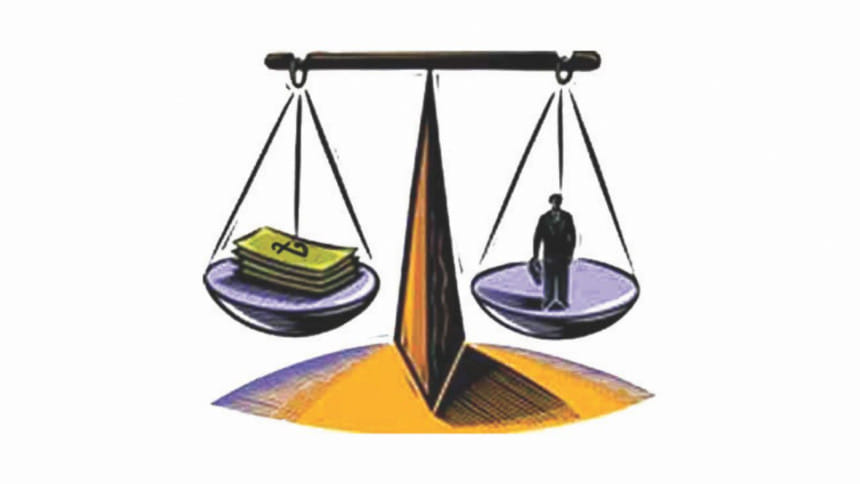Life, Compromised

How much does a life cost? For 55-year-old Selim Bepari, who used to work as a driver at a private firm till the evening of June 19, it was equal to the amount he earned in a month—Tk 22,000.
Selim Bepari was killed on June 19 at Mohakhali flyover, when an Audi SUV registered under the name of Awami League MP Muhammed Ekramul Karim Chowdhury's wife Kamrun Nahar Shiule, ran over him. According to witnesses, Ekramul's son, Shabab Chowdhury, was behind the wheel during the hit-and-run.
Some witnesses also chased Shabab, who fled from the spot right after the hit-and-run, and stopped at the NAM Bhaban where flats for MPs are allocated. According to the witnesses, Shabab argued with them when they demanded his apology and compensation for the victim's family. Shabab allegedly even snatched the mobile phone of one of the witnesses, who had filmed a video on it. He also threatened them, saying that they ought to be aware of his social and political status. He allegedly demanded to know “how many millions [they] would need to forget the incident.”
One of the witnesses went to the Kafrul police station to inform the police about the incident, after which the police went to the spot and retrieved the dead body. The deceased's daughter-in-law subsequently filed a case. Police have also identified the car and its owner. But curiously, they couldn't arrest anyone or even seize the car till now even though photos of the vehicle have spread through social media like wildfire.
But, when contacted, Mohammad Alim, a relative of Selim Bepari, claims that the family has already “settled the matter” after talking to the MP over phone. “The MP was very attentive towards us, and agreed to take the responsibility of the family. Selim's monthly income was about Tk 20,000-22,000 per month, and the MP has assured us he would send the family the same amount to their bank account every month,” says Alim. According to the affidavit submitted by the MP during the 2013 elections, his net worth that year stood at Tk 18.6 crores—this monthly transaction will only be a drop of water in his ocean of wealth.
When asked why they chose to accept the money, Alim explains that they don't have anyone in the family who can pursue a case against the MP. “Do you really think we will win if we go up against them?” asks Alim. In the absence of Selim, the lone breadwinner of the family, withdrawing the case is the best course of action, adds Alim.
However, when contacted, Kamrun Nahar Shiule, the owner of the car, informs Star Weekend that the police is investigating the matter. When asked if they contacted the victim's family to offer them money, she says, “I don't know anything about it. My husband may know that.”
But, is it legal to quieten victims with money or withdraw such a case? According to Barrister Jyotirmoy Barua, a Supreme Court lawyer, it isn't. “When an accused settles such a crime, it only means that s/he is openly agreeing to the fact in front of everyone that s/he has committed the crime. But the law cannot agree to it, since there is a clear provision that a case filed under Section 302 of the Penal Code 1860 is not in any way compoundable.”
“Withdrawing a case and settling are two different words, but the effect is more or less the same. It is the responsibility of the state to provide justice. Justice's main duty is to maintain equilibrium in society. The wrongdoer should be punished to maintain equilibrium in society,” he says.
“In a murder case, for instance, even though the family members can and do file cases, it is the state which represents the victim. Public prosecutors are recruited to fight on behalf of the state or victim. So, there is no way to settle a murder case,” he adds.

The next steps will require the police to investigate the matter and provide their findings to the court. What happens after that will depend upon the court.
According to former IGP of Police Mohammad Nurul Huda when a family decides against pursuing the legal route, the police can proceed with the case. But, in most cases, it doesn't bring anything fruitful in the end. “In such cases, the investigation officer reports to the court that the complainant doesn't want to proceed with the case, and the court ultimately discharges it,” he says.
Since there is discrimination and people from impoverished backgrounds have little understanding on what to do to get proper access to justice, most of the time they take the easy way out. Besides, in many cases, the victims receive threats from their powerful opponents. “Sometimes, the victim's families think that the legal battle is something prolonged and uncertain. Rather, taking financial help from the opponent is the best way to save the family,” explains Huda.
With the legal system biased towards the affluent, there are many instances where non-compoundable offences in the past were seemingly taken care of outside court by the more powerful party. As such, the case of Selim Bepari is not an isolated one.
For example, last year, a government official's Pajero car ran over a five-year-old child Sujana in Mohakhali, who lived in the slums with his parents. According to media reports, the identity of the government official was not disclosed by the Banani police. Also, the parents took the dead body of their daughter from the hospital, without performing an autopsy. They didn't even file a case, as the official assured them that he would provide a good amount of compensation and give a job to the child's mother.
There was a similar outcome in the much-discussed murder case of 12-year-old domestic help Jania Begum, who was reportedly raped, killed and thrown off the rooftop of the NAM garden of Mirpur. The agitated locals and the relatives of Jania even staged a demonstration with her body in front of the Kafrul police station, demanding the arrest of her murderers immediately.
Osman Gani, the father of Jania, who had filed a case, later sent a written application to the High Court showing his interest to dismiss it. In his application, he mentioned that his daughter passed away after falling off the building, and the accused government official Ahasan Habib, his wife Naznin Akhter and son Rummon Bin Ahsan, were not involved. However, right after Jania's death, a number of media reports showed that her corpse was found on the ground floor of the building with a piece of cloth tied around her mouth, and there were numerous scratches and bruises on private parts of her body.
It is important to distinguish between paying money to silence victims, and money paid as settlement for damages endured. The latter is a legal procedure which cannot be used in homicide and manslaughter cases according to the law of Bangladesh. The former is a bribe—given by the powerful to silence the weak—and our justice system is letting it happen unchecked.
It is time to focus on the proper implementation of our laws and create a legal system that works in favour of the victims. Until then, one can kill a person and get away with paying Tk. 22,000 per month or giving a job.

 For all latest news, follow The Daily Star's Google News channel.
For all latest news, follow The Daily Star's Google News channel. 



Comments